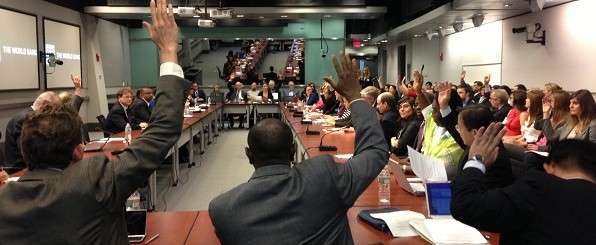February 2005
Consumers and human rights organizations have petitioned an arbitral investment tribunal administered by the World Bank International Centre for Settlement of Investment Disputes (ICSID), requesting transparency and participation in the arbitration proceedings initiated by privatized public services companies against Argentina.
On January 27, 2005, the Center for Legal and Social Studies (CELS), the Civil Association for Equality and Justice (ACIJ), Consumidores Libres Cooperativa Ltda. de Provisión de Servicios de Acción Comunitaria, Unión de Usuarios y Consumidores, and the Center for International Environmental Law (CIEL) submitted a petition for transparency and participation as amicus curiae to an ICSID Tribunal hearing a case brought by Suez’ subsidiary, Aguas Argentinas S.A., against Argentina.
This investment dispute before an ICSID Tribunal is at the heart of the controversy between the Argentine Government and a foreign investor concerning the provision of water and sanitation in the City of Buenos Aires and 17 districts of the Province of Buenos Aires (the largest concession area in the world). As in the other arbitration proceedings brought by companies supplying public services, Aguas Argentinas S.A. is demanding massive compensation for the alleged impact on its business brought about by the general economic emergency measures adopted by the Argentine government during the 2002 economic crisis.
Although this arbitration concerns the provision of essential public services in the City and Province of Buenos Aires, the public and the press have not had access to the documents presented in the arbitration. “This situation violates the right to access information and the right to participate in matters related to the provisions of public services, both rights protected in the Argentine Federal Constitution”, said Horacio Bersten, representative of the Unión de Usuarios y Consumidores, whose members live in the concession area.
The civil society organizations requested access to the hearings and to the documents produced in the arbitration. Additionally, they requested that the tribunal take into consideration fundamental international and internal rights and standards relating to public health, access to essential services, adequate standards of living, housing and consumer rights. The petitioning organizations — experts in such subject matters — requested leave from the tribunal to submit an amicus curiae brief to aid the tribunal in resolving these issues.
According to Víctor Abramovich, executive director of CELS, “our objective is to gain access to the information of the dispute, to provide new arguments from the perspective of the people affected, and to act as a watchdog in the process, including with respect to Argentina’s defense.”
The petition for transparency and participation also elaborated on the public interest nature of the dispute, observing that the decisions questioned by Aguas Argentinas S.A. involve general measures adopted by the Argentine State in the exercise of its regulatory power, that closely relate to the manner whereby inhabitants have access to, and enjoy, essential public services like drinking water and sanitation.
In spite of the public interest involved in the investment dispute, the public has not had access to the arbitration documents and hearings. “Investment treaty arbitrations resemble a medieval order, where obscurantism, obfuscation, and secrecy are suppressing democratic values”, observed Marcos Orellana, Senior Attorney with the Center for International Environmental Law.
The need for transparency and the participation of consumer, human rights, or environmental organizations in cases that concern the public interest has been recognized by other international courts. The petition underscores that the trend toward greater transparency and participation in international adjudication reflects progress in the direction of an international legal order where the fundamental rights of all peoples can be fully realized, in the spirit of the Universal Declaration of Human Rights.
In their petition for transparency, the civil society organizations pointto the serious conflicts of interest apparent in this case. These conflicts of interest arise from the close relationship between ICSID and the other institutions of the World Bank Group that have a concrete interest in the case, particularly the International Bank of Reconstruction and Development (IBRD) and the International Finance Corporation (IFC). In fact, the IBRD played a central role both in the design of the regulatory framework and in the privatization of water services. Further, the IFC holds 20% of Aguas Argentinas S.A. international debt and owns 5% of its equity shares. In addition, the President of the World Bank is ex oficio President of ICSID’s Administrative Council, and in some circumstances has the power to appoint arbitrators.
Gustavo Maurino, director of the Civil Association for Equality and Justice, pointed out that, “Under these conditions, the publicity of the files and the participation of the citizens becomes crucial to secure equity and due process”.
- Click here for the original Spanish version of the petition
- Click here for the English translation of the petition
For further information, please contact:
Marcos Orellana (CIEL), morellana@ciel.org
